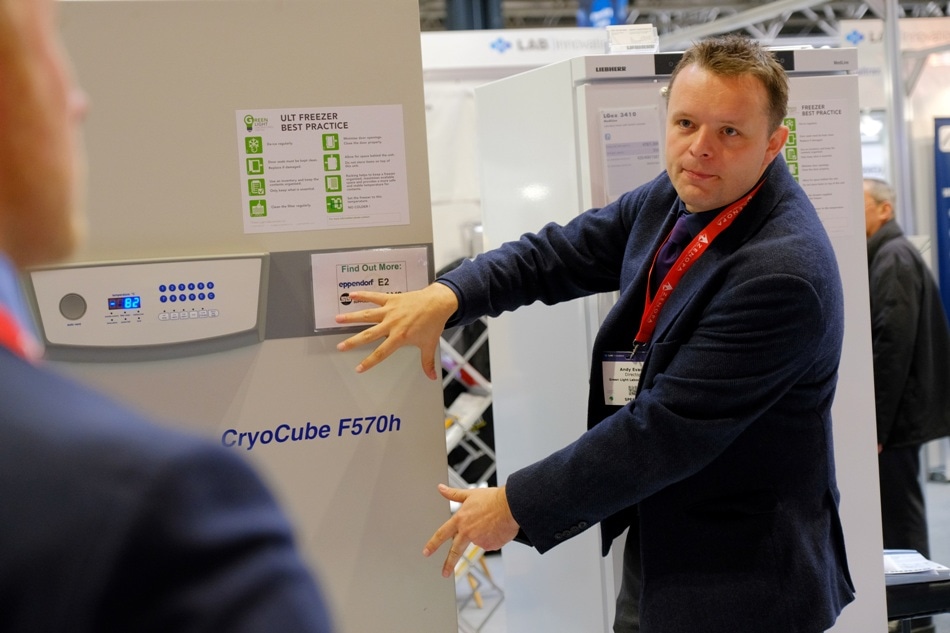Oct 4 2019
Lab Innovations, the UK’s only trade show dedicated to the laboratory industry, will showcase at Birmingham’s NEC, 30 & 31 October, multiple options to help visitors future-proof their laboratories - from innovative products, to waste reduction (time included!) and sustainability.
 Andy Evans in action in the Lab Innovations’ Sustainable Laboratory zone
Andy Evans in action in the Lab Innovations’ Sustainable Laboratory zone
This focus is reflected in many of Lab Innovations’ key areas, including the Sustainable Laboratory zone, the Royal Society of Chemistry, Insights & Innovation and Live Lab theatres, as well as on the stands of numerous scientific exhibitors.
Sustainable Laboratories:
Research lab buildings can account for up to 70% of some universities’ carbon emissions, and consume 10 times more energy and at least four times more water [per unit area] than office spaces. So it is no surprise that the Sustainable Laboratory zone - developed by Green Light Laboratories - returns after highly positive feedback about last year’s exhibition. “I attended the Sustainable Laboratory tour which I found interesting and informative”, said Alison Lees, College Laboratory Manager, Institute of Biomedical Research, University of Birmingham. “The best attribute of the show was definitely being able to talk with many manufacturers in one place. Particularly interesting were the companies who were new to me and discovering what they had to offer for a sustainable user-friendly laboratory.”
Increased in size for Lab Innovations 2019, the Sustainable Laboratory zone will show visitors how even small improvements in technology, procurement and best practice can reduce running costs, making funding go further. “Sustainability is the future for how we select, buy and use our lab equipment”, said Andy Evans of Green Light Laboratories. “We are excited to showcase how sustainability is saving labs thousands of pounds and safeguarding UK science, and I will be highlighting the latest innovations in lab products, as well as how lab practices and procurement can become more sustainable.”
Attendees will see how Green Light Laboratories has worked with leading UK universities and institutions, helping them to increase their use of ‘green’ equipment and processes and achieve sustainable results. Real life case studies on core lab equipment including comparisons of ‘lab freezer performance’, ‘media sterilisation technology’ and ‘chiller versus water’ will all be available in the zone. Relevant equipment can also be seen on the show floor from many suppliers, including SLS, Julabo, GPE Scientific, Shimadzu, PerkinElmer, Analytix, IKA and Cole-Parmer.
Talking sustainability & recycling:
Further insight into green procurement, and improving lab sustainability and efficiency through green initiatives, will also be highlighted in the show’s Live Lab theatre. For example, the Laboratory Efficiency Assessment Framework (LEAF) is a new tool developed by UCL with input from 16 other research institutions around the UK and Ireland to help quantify savings and benchmark comparable results within the lab.
In the Royal Society of Chemistry theatre, celebrations continue for the International Year of the Periodic Table (IYPT) and speakers will focus on the chemical elements that make up this iconic and fundamental scientific tool. Here visitors can learn about efficient recycling of precious elements, and discover more sustainable alternatives to some of the elements commonly used in the lab.
The two days of expert talks include ‘Mining the Scrapheap’ by professor Jason Love, University of Edinburgh, which will cover the chemical techniques that underpin the recycling of gold and rare-earth elements. As professor Love explains: “To adopt a circular economy and the environmental and societal benefits it brings, we need to have the ability to recycle end-of-use products. These include electronic devices such as smart phones that contain metals seen as critical resources, but which are not being recycled to their full extent at the moment.”
Continuing the sustainability and recycling theme, Sarah Wilson, Technical Manager at Sellafield, will provide a brief overview of 70 years of nuclear reprocessing and also look to the future, including the challenges of reprocessing and how waste can be reused. Among the many other talks, expert speakers will look at the recycling of lithium ion batteries, rare earth metals and magnets. The full conference programme is available to view at www.lab-innovations.com.
Lab future-proofing:
The Perkin Elmer-sponsored Insights & Innovation theatre will again be curated by Laboratory News, providing insight into the latest discoveries and discussing best practices and day-to-day challenges for lab management, particularly around digitisation and sustainability. Industry professionals will explore the uses of AI in research, virtual reality in laboratories, sustainable equipment and supporting technical staff, of which there is a national shortage.
With over 160 exhibiting suppliers and manufacturers, visiting Lab Innovations is the ideal way to gain insight into the future of laboratories. Just a few examples of green lab equipment on show on exhibitor stands include: freezers in the SLS Pavilion; chillers from Julabo; microwave sterilisation technology from GPE Scientific; refrigeration and safety cabinets from Haier Biomedical; GuardOne® workstation from STARLAB. Some exhibitors are also adopting a sustainable approach to their exhibition stands to minimise environmental impact and waste generation. For example, high precision thermoregulation specialists Huber are recycling some old laboratory frameworks to build their stand.
Sarah Almond, Senior Forensic Science Technician, University of West of England, summed up her experiences from last year’s show and seeing new products: “One of the best things about Lab Innovations is finding out from exhibitors about products that exist that I didn’t know existed, but which could be very useful to our work. It’s great to be able to keep track of what’s going on in the market and to see both big and small lab-focused companies all in the same place along with their very latest innovations.”